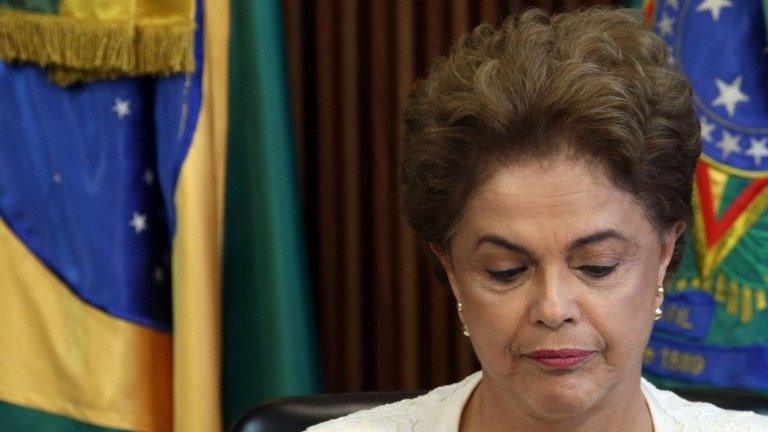'Wronged and betrayed' Rousseff defends her record
- Published
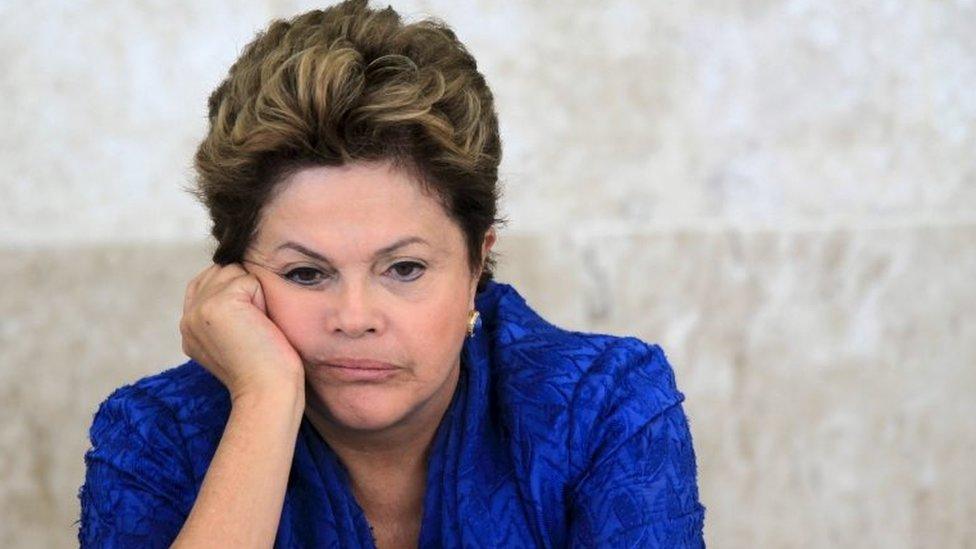
Dilma Rousseff looks down, but she insists she is not out
It is, to many observers, abundantly clear that Dilma Rousseff does not enjoy frontline politics.
The Brazilian president is ideologically driven, intelligent and committed to her mandate.
But, compared to the tact and political nous of her predecessor, President Luiz Inacio Lula da Silva, the current incumbent of the presidential palace in Brasilia casts a lonely figure, reluctant to immerse herself in the deal-making, opportunistic world of Brazilian politics.
Even some of her allies agree that, although re-elected as president two years ago, Ms Rousseff has not been a particularly great or successful leader.
'Feeling betrayed'
Brazil's first female president is going through one of the most difficult periods of her political life.
This week she walked out slowly, barely managing a smile, before the foreign media in Brasilia.
Dilma Rousseff: "I don't think it is a question of mea culpa"
The make-up could not conceal the tired lines on the face of a woman who feels she is being wronged and betrayed by a misogynistic, treacherous Congress.
She looks down, but Dilma Rousseff insists she is not out.
"More than 50 million people voted for me so my political enemies, who couldn't accept defeat at the polls, have been plotting against me from day one," said Ms Rousseff in a long defence of her record.
The formal charges against the president are that she used a series of (well-established) financial tricks to conceal the size of the budget deficit in the run up to elections.
During the cut and thrust of the three-day-long Congressional debate on impeachment and the subsequent vote, Dilma Rousseff was hardly seen in public.
She cancelled a scheduled appearance at a rally in Brasilia, disappointing many of her supporters who had travelled extremely long distances (mainly by bus) to keep vigil outside Congress as the results of the impeachment vote came in.
The official reason for impeachment was mentioned by barely a handful of deputies as they voted.
Few observers were left in any doubt that this was, in reality, a vote of confidence in Dilma Rousseff's inability to tackle Brazil's worsening economic crisis.
Now, in the days following her humiliating defeat by more than two-thirds of the 513-member Congress, the woman who could be in the last weeks of her presidency and is facing the probability of a full impeachment trial in the Senate, has belatedly been giving a detailed rejection of the charges against her.
But it all feels rather too late.
No regrets?
The irony is that someone who insists she is not corrupt and has not gained personally or financially from the corruption scandal that is engulfing Brazil, is the one being led to the gallows.
Under President Lula, Brazil's economy had boomed, millions were brought out of poverty and everyone was happy to share in the good times.
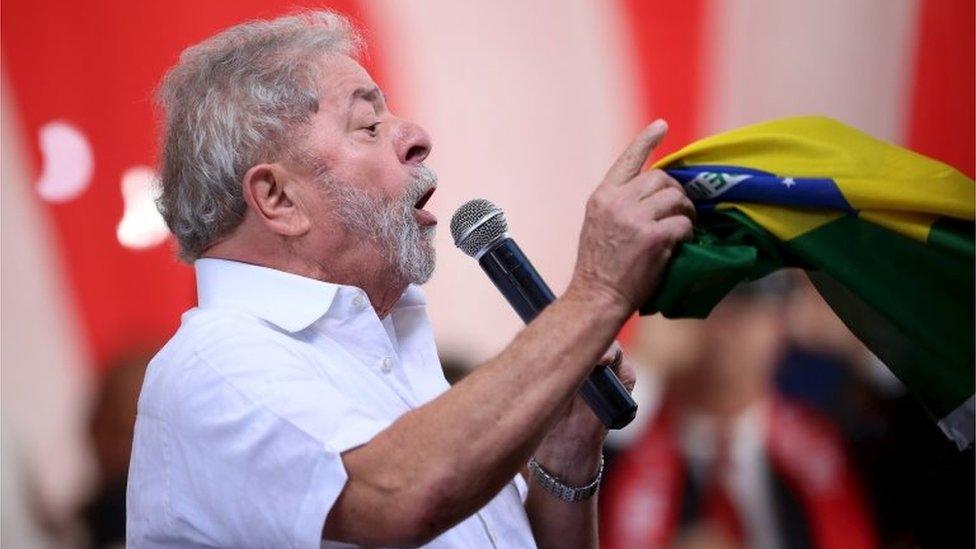
Former President Lula has come to the defence of his successor in office
Dilma Rousseff's mistake when things started to go wrong was that she was unwilling, or unable, to play by the rules - the shady deal making with big business and political opponents - that had served President Lula so well.
Thomas Traumann, former minister of social communication under Dilma Rousseff, paints a picture of an indecisive leader.
"There was no mea culpa" over the country's economic crisis, Mr Traumann told the BBC.
"Now it's far too late," added the former minister who had warned of impending chaos before he left the government last year.
Line of succession
Speaking to the foreign media, Dilma Rousseff would not even mention by name her Vice-President, Michel Temer, or the Speaker of the lower house of Congress, Eduardo Cunha.
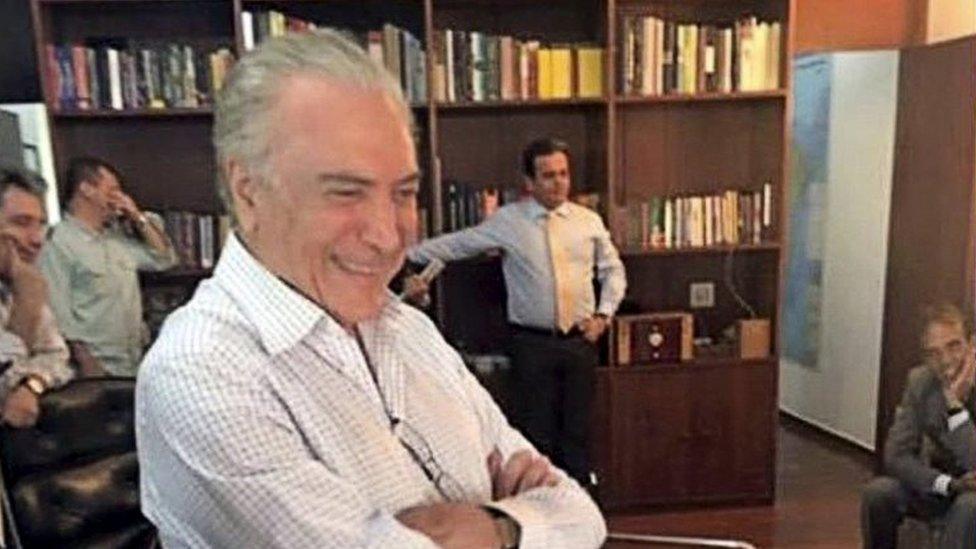
Many newspapers commented on the fact that Vice-President Michel Temer appeared delighted by Sunday's vote
Both men belong to the broad and ideologically loose PMDB party and both would benefit from Ms Rousseff's departure.
Mr Temer, the first in line to succeed a suspended Ms Rousseff, is theoretically liable to the same charges as she is, given his role as her deputy.
Mr Cunha, an ice-cold operator who orchestrated the impeachment vote in Congress, has been accused of serious corruption charges, which he denies.
He has, with limited success, tried to divert attention with his attack on President Rousseff.
Another Congressman that Dilma Rousseff could not bring herself to name, for much more personal reasons, was Jair Bolsonaro.
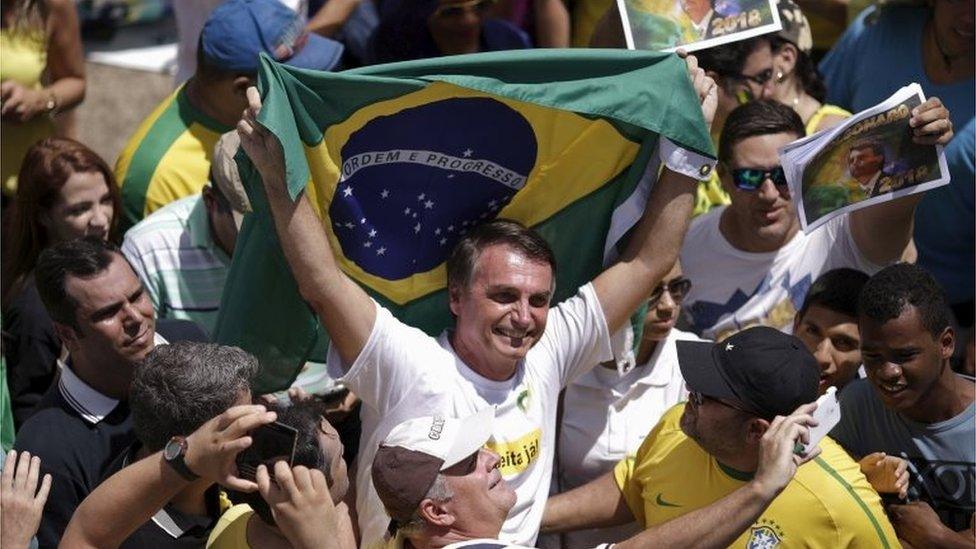
Jair Bolsonaro (holding up a flag) caused outrage among many Brazilians when he dedicated his vote to Carlos Brilhante Ustra
Hugely popular with right-wing voters, the anti-gay former military officer dedicated his vote in Congress to one of the former dictatorship's most feared torturers and human rights abusers, Carlos Brilhante Ustra.
Ms Rousseff was tortured as a political prisoner in the 1970s, so I asked her about the attacks in Congress.
"It is regrettable," said Ms Rousseff.
"I was a prisoner and I knew the man he is referring to quite well. He was one of the biggest torturers Brazil has had.
"It's lamentable that this moment in our history has opened the door to intolerance and hate," she added.
It is often said of a country that you get the leaders you deserve.
Dilma Rousseff may not have been a great president but she surely deserves to be treated with more respect and dignity.
She could be replaced by any one of several male politicians who are accused of far more serious corruption offences, or even by the man who mocked the abuse she received as a prisoner in the 1970s.
Then perhaps, Brazil and its sullied political system - of which the governing Workers' Party is a fully paid-up member - will get the government that it deserves.
- Published31 August 2016
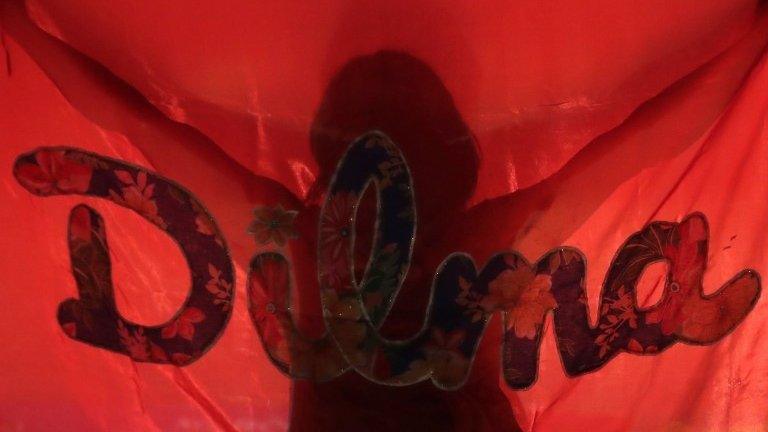
- Published12 May 2016
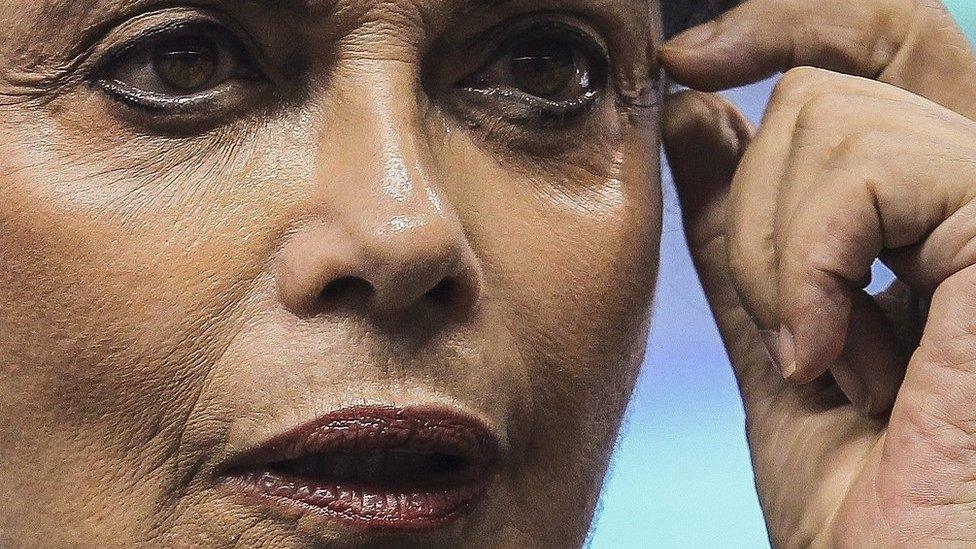
- Published29 March 2016
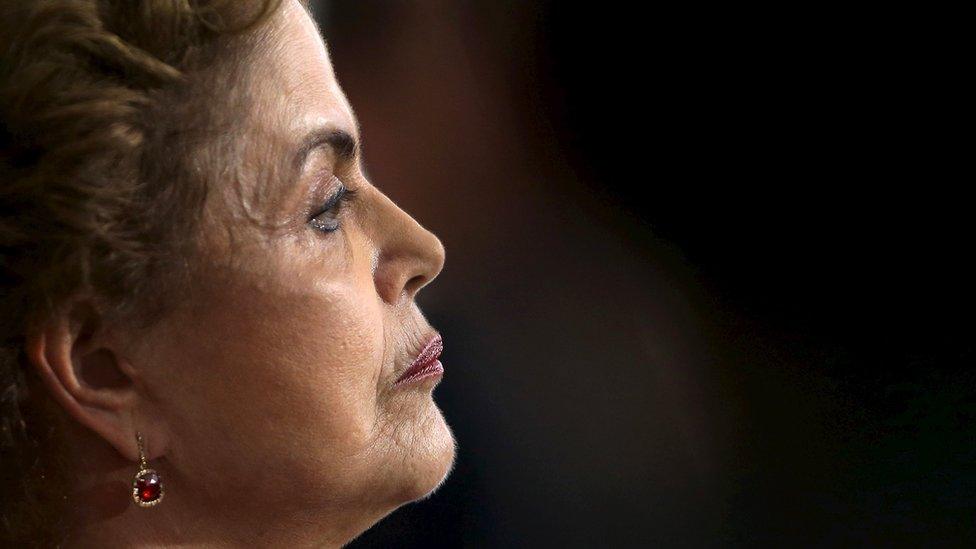
- Published8 April 2018
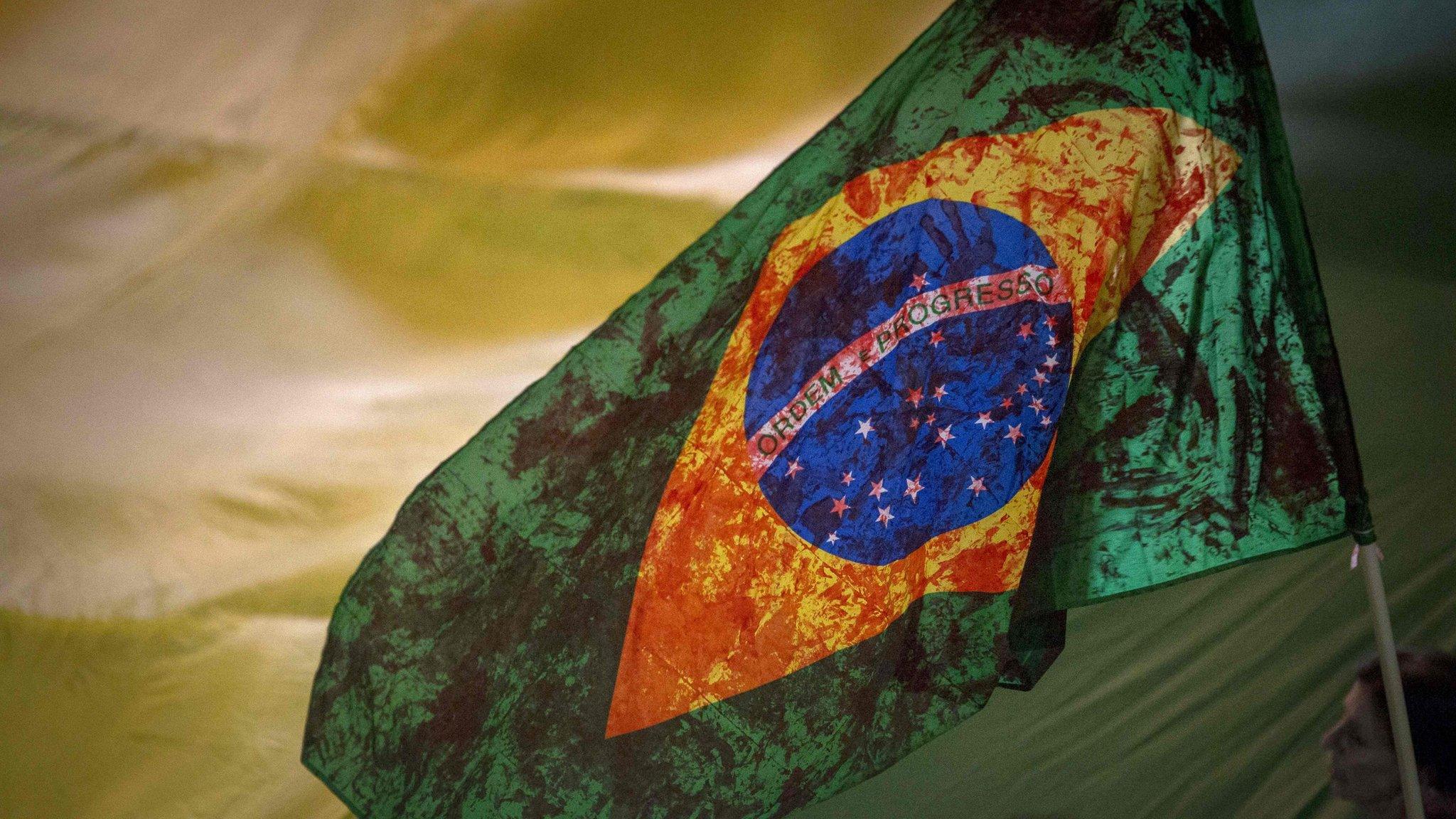
- Published4 March 2016
